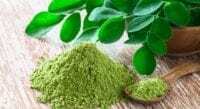
Scientific Facts of Moringa Oleifera
In a growing list of popular superfoods dominating the news lately, the highly nutritious Moringa somehow always gets overlooked and ignored. Known as one of the most nutritious plants on the planet, Moringa is a powerhouse of vitamin C, calcium, and other nutrients that is found in abundance in its home country of India.
It is also a favorite ingredient among many Indian cuisines, the makers of which are seldom aware of its wholesome and health enriching bounty. In a recent study conducted on this fascinating plant, it was found to inhabit over seventeen different types of essential amino acids. Moreover, almost 70 % of the plant’s constituent was made of protein.
It is this very merit that is finally getting the plant the attention it rightfully deserves. In this article, we would like to familiarize you with this essential superfood, acquaint you with Ayurveda’s insight on it while also sharing how you can appropriately incorporate this healthy food into your daily diet.
So without much further ado, let’s get started.
Moringa in Ayurveda
Ayurveda has always been the champion at identifying herbs and food growing on earth’s nourishing soil that pack a variety of health benefits to improve our lives. Moringa is no exception. Moringa is defined by the heating effect it exhibits.
In fact, it is bitter and hot in taste. The plant exhibits crucial properties of being light, dry, fluid, and sharp. It is these properties that make Moringa an effective detoxifying and cleansing agent. Moringa is said to possess the potential of penetrating deep into the human tissues, in order to deeply cleanse and flush out toxins from every nook and cranny of our system.
Other documented benefits of Moringa include strengthening the heart, promoting longevity, and improving energy. Moringa can help reduce both excess kapha and vata. Due to its dry, sharp, and light properties, it is recommended to be taken in moderation, failure of which can result in vata aggravation. It is not recommended to pacify pitta imbalances due to its heating capability.
5 Moringa leaves Healthy Benefits That You Should Know
1 – Best content of Nutritious - Moringa Leaves
The Moringa plant is extremely nutritious. All parts of the plant can be incorporated into your diet and have something or the other to offer when it comes to nutrition. The plant is a powerhouse of nutrition, brimming with rich amounts of Vitamin C, Vitamin A, Protein, Iron, Magnesium, and Potassium.
Moringa because of its high nutrition content can help people make up for nutrition deficiency that is most common in western households due to their diets. A typical western diet misses all of the nutrients required, which are compensated by having a bowl of Moringa leaves with their meals.
2 – Rich Antioxidant - Moringa Leaves
Its rich Vitamin C and beta-carotene content make Moringa an ideal anti-oxidant food to have in your regular diet. Moringa can eliminate high levels of free radicals from the body that are responsible for escalating oxidative stress. This makes the plant extremely effective in fighting heart disorders and type-2 diabetes.
Moringa also contains other antioxidants such as quercetin and Chlorogenic acid that can reduce blood pressure and moderate blood sugar levels respectively. Apart from the above, Moringa can also be used as a food preservative to extend the shelf life of perishable food items.
3 – Reduce Inflammation - Moringa
Inflammation occurs when the body is responding to injury or infection. It is essential but can cause severe problems in the long term. Moringa can be an effective food against inflammation, thanks in large part to its anti-inflammatory compound isothiocyanates. These compounds are found primarily in moringa seeds, leaves, and pods.
As inflammation is linked with several serious health conditions, moringa can be an effective option to tackle heart disease and cancer.
4 – Moringa leaves helps to reduce blood sugar level
A high blood sugar level in the body makes it vulnerable to a variety of serious diseases. Therefore it is extremely important to keep your blood sugar levels in check. Moringa is known to make sure this happens.
In a study conducted on 30 women wherein each one was given 1.5 teaspoons of moringa leaf powder every day, it was found that their blood sugar levels dropped by 13.5 %. Another study conducted on six people found that a bit of moringa leaves added to their regular meals reduced the rise in blood sugar by 21 %
5 – Moringa eliminate toxins in our body
Moringa is a great option to flush out toxins from the body. Free radicals and other harmful toxins leave the body vulnerable to life-threatening conditions like cancer and heart attack. Moringa can be very effective in detoxifying your body due to its light, dark, and sharp nature.
Moringa has also exhibited fantastic finesse in protecting the body from arsenic toxins that can prove dangerous to the human body.
Add Moringa in your Daily food
Moringa powder can be a great addition to your morning smoothies or shakes. You can also add it to your bowl of oatmeal for optimal health benefits.
You can also take moringa traditionally with a teaspoon of ghee or honey. To take vata imbalance, Ayurveda recommends taking Moringa with a glass of warm milk, with some honey added to the concoction.
The Bottom Line
Moringa is a qualified superfood that no one seems to talk about more often. It packs vitamin C that is 7 times more than orange, and potassium that is 10 times more than what is found in Banana. It can very well be the answer to a variety of health issues that you are facing or may face in the near future.
To incorporate moringa efficiently into your daily diet, we recommend you seek advice from an expert Ayurvedic practitioner. With their aid, you will be able to make the best out of this phenomenal herb and maintain optimal health on a consistent basis.
Note: The information in this article is intended for your educational use only and is not a substitute for professional medical advice, diagnosis, or treatment. Always seek the advice of your physician or other qualified health providers with any questions you may have regarding a medical condition and before undertaking any diet, supplement, fitness, or other health programs.





